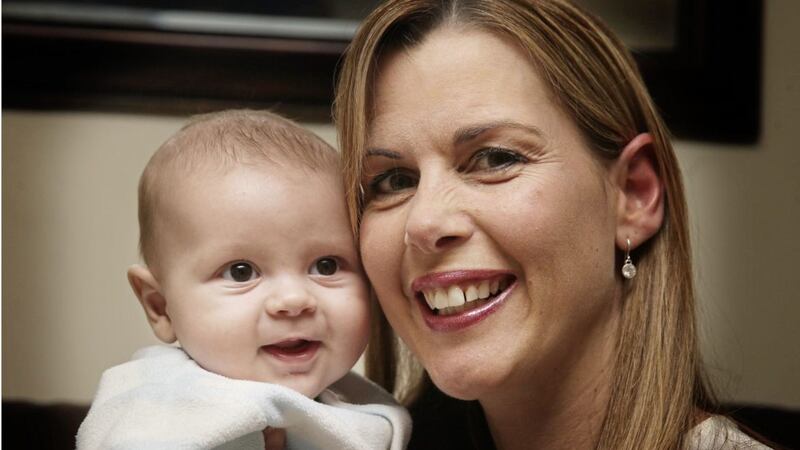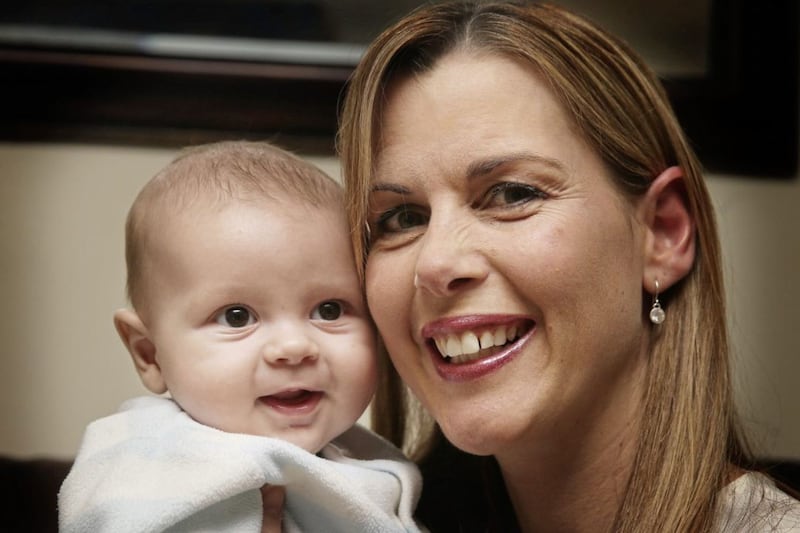A woman who suffered a rare and often fatal complication during childbirth - seen only once in the past 30 years at a Belfast hospital - speaks to Suzanne McGonagle about the "absolute miracle" of still being alive.
WHEN Jude Armstrong was induced in the ninth month of her pregnancy, little did she know her life and that of her unborn son would hang in the balance.
She was suffering from amniotic fluid embolism – a rare and dangerous condition which affects just one in 80,000 women.
Doctors at the Royal Victoria Hospital faced a race against time to save the lives of Mrs Armstrong and her unborn son.
To highlight her gratitude to the medical team who saved her life, the Newtownabbey woman has relived the trauma she faced as her body began to shut down.
“I feel so unbelievably blessed,” she said.
“They had prepared my family for the worst. It’s an absolute miracle that I am here and I am just so thankful.”
Mrs Armstrong told how, having experienced a trouble-free pregnancy with her third child until that point, she looked forward with husband Nathan and sons Connor (six) and Mason (four) to meeting their new arrival.
“I had a very healthy, normal pregnancy but because I was so big near the end it was decided I would be brought in a week early for a routine induction,” she said.
“Although I was nervous about being induced, it was my third baby so I thought I knew what to expect.
“However, the last thing I remember is that my contractions were coming thick and fast and then I remember my waters breaking.
“Nathan told me I turned purple and collapsed. He tried to give me mouth to mouth and then the medical staff just swung into action and whisked me away.
“Medical teams carried out an emergency caesarean section. He said that two minutes later he was handed a baby.
“He tried to tell them, ‘No you have made a mistake – this isn’t my baby as my wife has just gone in there’ but it was our baby.”
Mrs Armstrong had suffered an amniotic fluid embolism, a rare and not well understood obstetric emergency where amniotic fluid of hair, cells or other debris from the foetus gets into the mother’s bloodstream and triggers an allergic reaction.
It leads to organ failure, heart and lung collapse and profuse bleeding that will not clot. It is the fifth most common cause of maternal mortality in the world.
“I’m told there was a lot of unknown at that stage. Nathan thought I’d had a heart attack,” Mrs Armstrong said.
“But I had had an amniotic fluid embolism, which a lot of medical professionals have never dealt with. After they got Ronan out I went into cardiac arrest twice. I’m told my heart stopped for several minutes.
“They got my heart restarted and then it stopped again and they got it restarted once again.
“Then I suffered massive haemorrhaging and I was transfused with nine litres of blood. Apparently they couldn’t get the blood into me quick enough. I was given an emergency hysterectomy because of the bleeding from my uterus.”
Mrs Armstrong was taken to intensive care, where she remained in an induced coma for 24 hours until she woke to find herself holding hands with her twin sister Rosie.
“I had the cream of the crop looking after me, the best consultants, obstetricians and cardiac doctors on hand,” she said.
“They told me that there’s not a lot known about amniotic fluid embolism. It’s so unbelievably rare. There has only been one other reported case in the past 30 years at the Royal and sadly that person did not survive.
“The chances of a woman suffering from this are about one in 80,000. It’s just so rare.”
Mrs Armstong said she was told she “went from being the sickest person in ICU to being the healthiest person in ICU”.
“My family were my absolute saviours. Nathan brought Ronan in to me when I was so ill to give skin-to-skin contact,” she said.
“And whenever I was unconscious, he played footage of the boys to me and he said that my heart began to beat faster when it was being played.
“I was in hospital for three and a half weeks. At first I couldn’t walk. I couldn’t lift Ronan. But day by day I got stronger.”
Mrs Armstrong said she believes it is an “absolute miracle” that she is alive but it is the work of the medics she is “truly thankful for”.
“I feel so unbelievably blessed. They had prepared my family for the worst,” she said.
“They didn’t know if I would survive and if I did survive, they thought I might have suffered massive brain damage or damage to my heart or lungs.
“They have said there’s no lasting damage to my heart or brain, which is unbelievable given what my body went through. It’s an absolute miracle that I am here and I am just so thankful.
“From the midwives in Johnston House, anaesthetist, consultants, cardiologists, obstetricians, in particular Katie Johnston – they were just amazing. Everyone who was involved in my care was just absolutely fantastic.
“They all swung into action so quickly and from then on were there to help me get better.”
Ronan was born at a healthy 10lb 3oz.
“He’s the happiest, most content little boy which is exactly what I needed, especially during my recovery,” Mrs Armstrong said.
“Lots of people say to me, ‘You were so unlucky’ but I really don’t see it like that. I feel the luckiest person on the planet.”



